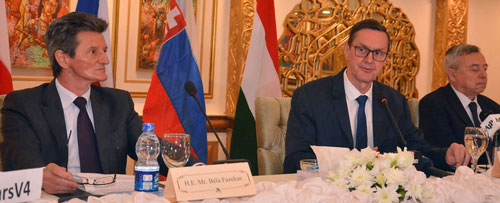Zubair Qureshi Islamabad
Ambassadors of Poland and Hungary and Deputy Head of Mission (DHM) of Czech Republic on Monday at a joint news conference briefed the media persons about the Visegrad Group or V4 countries—Poland, Hungary, Czech Republic and Slovakia— and gave a historical background of the Visegrad Cooperation declaration signed in 1991 on Feb 15.
Since the 30th anniversary of the historic accord coincided with Poland taking over presidency of the group (July 2020-June 2021), Polish Ambassador Piotr Opalinski accompanied by his Hungarian counterpart Bela Fazekas and DHM of Czech Republic Antonin Hradilek gave the historical background and cooperation among the four countries of the Central Europe, their achievements in cultural, social and economic fields.
Thirty years ago, he said on 15 February 1991, the presidents of Poland and the Czech Republic, and the prime minister of Hungary signed the Declaration on Cooperation between the Czech and Slovak Federal Republic, the Republic of Poland and the Republic of Hungary in Striving for European Integration in the castle of Visegrad, Hungary.
He said the V4 nations are already engaged in a number of bilateral agreements aimed to boost tourism, investment and education ventures with Pakistan and see immense opportunities exist there.
In the post-pandemic era, we look forward to enhancing cooperation with Pakistan, he said. The Declaration, said Ambassador Piotr Opalinski provided a political framework for extensive cooperation between Poland, Czechoslovakia, and Hungary, and brought closer the societies of the three, and later four, countries.
To a question, the Polish ambassador said the original aim of cooperation was the striving for the full recovery of the states’ independence, democracy and liberty, eradication of symptoms of totalitarian regimes, construction of parliamentary democracy, respect for human rights and fundamental freedoms, establishment of free market economy, comprehensive participation in the European political and economic system, as well as the security and legislative system.
The accession of our countries to the North Atlantic Treaty Organization (NATO) and later joining the European Union (EU), symbolically closed this first stage and opened new perspectives for the Visegrad cooperation, he said.










